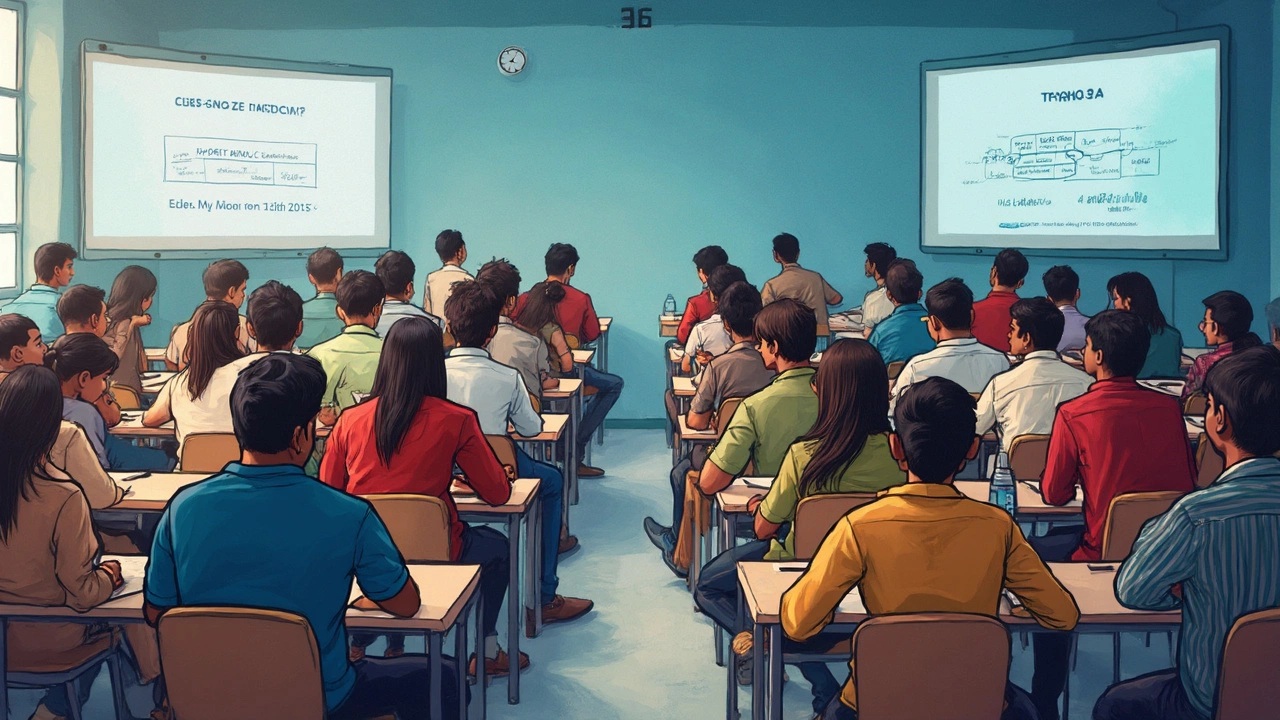
So, open competitive examinations – what are they exactly? Picture this: a level playing field where anyone with the right skills can compete for prizes, scholarships, or jobs. These exams serve as a fair way to assess candidates based on their merit, without bias or favoritism. Pretty neat, right?
Now, you might wonder why these exams are such a big deal. Well, in many places, they're a key part of landing jobs in the public sector, bagging a scholarship or even securing a spot in a prestigious university. They're like a ticket to your dream career if you play your cards right.
- What is an Open Competitive Examination?
- Importance and Opportunities
- Structure and Types of Questions
- Preparation Tips and Strategies
What is an Open Competitive Examination?
Alright, let's break it down. An open competitive examination is exactly what it sounds like: a contest open to anyone who meets the basic criteria, and that's the first thing that makes it fair. Instead of connections or luck, it's your abilities and knowledge that are put to the test.
This type of exam is typically used for selecting candidates for public service roles, awarding educational scholarships, or for admissions to specialized programs. Since it's an open competition, it ensures that every candidate stands a chance based on their merit alone.
How Does It Work?
These exams come with a structured process. Candidates face various standardized tests that evaluate skills like reasoning, verbal ability, and sometimes domain-specific knowledge. Imagine sitting in a testing hall and filling out a multiple-choice question paper that everyone else is filling out too, with no prior hints or special treatment.
Who Organizes Them?
You'll find them all around the world, usually organized by governmental bodies, educational institutes, or other credible organizations responsible for ensuring transparency and fairness in the selection process. It’s a method highly trusted for hiring civil servants, from local clerical jobs to top-tier administrative positions. Many governments swear by it to keep things honest.
Key Facts You Should Know
- Anonymity: These exams are usually anonymous to ensure impartial grading.
- Objective Assessment: They're designed to objectively assess your skills and knowledge without any bias.
- Extensive Reach: They open doors for candidates from diverse backgrounds, giving everyone the same shot.
Although the specifics can vary depending on the role or institution, the ethos remains constant: fair competition. So whether you're vying for a government job or a spot in a competitive academic program, understanding this process is crucial.
Importance and Opportunities
When we talk about open competitive examination, we're diving into something that can truly be a life-changer. These exams open doors to opportunities you might not easily access otherwise. But why are they crucial? Let’s break it down.
The Importance
Competitive exams ensure a merit-based selection process. What does this mean for you? Simply put, it doesn’t matter who you know or your background. Your performance is what counts. This makes it a reliable way for organizations to find the right talent based on skills and knowledge.
Plus, these exams often come with government backing, adding a layer of authenticity and trust to the process. Many sectors, especially the public sector, rely heavily on these exams to fill various positions—from administrative roles to technical jobs.
Opportunities Galore
The cool bit is that passing a competitive exam is like holding a golden ticket. Whether it's landing a cushy government job or snagging that hard-to-get scholarship, the rewards are substantial. For instance, in India, exams like UPSC and SSC are gateways to prestigious jobs with benefits like job security and societal respect. Similarly, exams like GRE or TOEFL can open international study opportunities.
It doesn’t just stop at jobs and education. Many exams offer cash prizes or other incentives to high achievers. It’s more than just an exam; it’s an opportunity to elevate your career trajectory.
| Exam | Opportunity | Region |
|---|---|---|
| UPSC | Administrative Services | India |
| GRE | Graduate Education | Worldwide |
| SSC | Various Government Roles | India |
So, if you’re gearing up, remember that a world of opportunities awaits. All you need is thorough preparation and dedication, and these exams can indeed be the stepping stone to your aspirations.

Structure and Types of Questions
Alright, let's talk structure. Open competitive examinations typically follow a pretty standardized format, designed to keep things fair and square. While the exact setup can vary depending on the exam, there's usually a mix of different question types. Understanding these can really up your game.
Multiple Choice Questions (MCQs)
MCQs are a staple in most competitive exams. They're designed to test your knowledge across various subjects quickly. You’ll usually get a question with four or five options — only one’s correct, though! The idea is to gauge both your knowledge and decision-making skills in a time-crunch.
Descriptive Questions
Some exams throw in descriptive questions too. Here, you’ll need to write detailed answers, typically when assessing subjects like essay writing, critical analysis, or comprehension. These questions evaluate your depth of understanding and how well you can express your thoughts.
Problem-Solving Questions
You'll often encounter problem-solving questions in exams focusing on technical or logical skills. These might involve calculations, logical reasoning, or data interpretation. These aim to test your analytical abilities and how you approach complex situations.
Sectional Divisions and Weightage
Many exams are divided into sections, each targeting a different skill set. For instance, there could be separate sections for language skills, quantitative aptitude, and general awareness. Each section might carry varying weightage, and sometimes, there’s a cut-off for individual sections.
A Glance at Some Statistics
Let's check out a quick example of how this breaks down in a typical exam format:
| Section | Number of Questions | Marks |
|---|---|---|
| Language Skills | 50 | 150 |
| Quantitative Aptitude | 50 | 150 |
| General Awareness | 50 | 150 |
Knowing this can help you manage time effectively during the actual exam.
All this might sound intense, but with the right preparation, you'll get the hang of it. Practice papers are your best friends here. They're great for familiarizing yourself with the exam pattern and checking how quickly you can tackle different types of questions. So keep practicing, and approach each type with a strategy in mind.
Preparation Tips and Strategies
Tackling an open competitive examination might seem daunting at first, but the right prep can make all the difference. Here, I'll walk you through some practical tips to boost your chances of success.
Understand the Exam Format
The first step? Know your battlefield. Each competitive exam has its own format, rules, and types of questions. Are you looking at multiple-choice questions, essays, or maybe some tricky problem-solving? Gather all this info and review it until you've memorized it. It's like knowing the game before playing.
Create a Study Plan
Random studying usually doesn’t cut it. Map out a realistic plan that includes daily goals, deadlines, and breaks. Make sure each day is productive by having a clear focus. And remember, consistency beats cramming any day.
Practice with Past Papers or Mock Exams
This might sound like a no-brainer, but it's super effective. Practice with previous years' question papers or take mock exams. This not only tests your knowledge but gets you comfy with the time constraints. Plus, it's a great way to spot patterns in the kind of questions usually asked.
Focus on Weak Areas
We all have those subjects we dread. Instead of avoiding them, tackle them head-on. Spend extra time improving these weaker spots as they're often the areas where you can make the most progress.
Join Study Groups
Study groups can be a lifesaver. They offer support, provide new insights, and keep you motivated. Plus, explaining topics to others is a great way to solidify your understanding.
Take Care of Yourself
Yep, self-care is part of the prep. A healthy body and mind boost memory and stamina. Eat well, sleep enough, and exercise regularly. You'll feel the difference.
Consider a Prep Course
If self-study isn’t doing the trick, look into enrolling in a prep course for your competitive exams. These often provide expert guidance and structured learning paths, making the whole process less overwhelming.
Track Your Progress
Keep an eye on how you’re doing. Are you meeting your study goals? Are mock test scores improving? Adjust your plan accordingly to stay on track.
Stay Positive
Lastly, keep the right mindset. Confidence goes a long way. Remember, this exam is just a step on your path, not the whole journey. Keep motivated and remind yourself of your goals regularly. You've got this!







